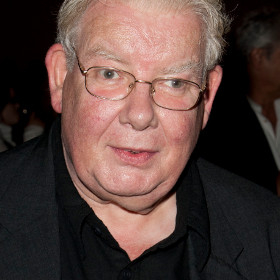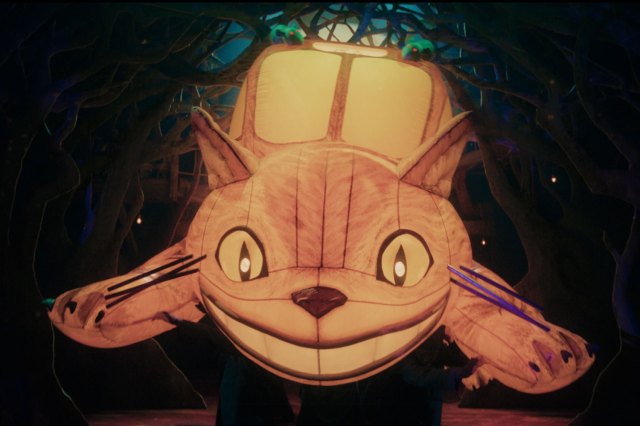Michael Coveney: Bennett remembers Griffiths in a year of comedy losses

© Dan Wooller
The first week of the New Year means the latest instalment of Alan Bennett's diary in the London Review of Books, and this year he's remembering Lady Thatcher and Richard Griffiths, the first slightly less warmly than the second. His suggestion that "Thatch" (as a virulent Ben Elton used to call her in the 1980s) was a mirthless bully who should have been buried at night, as once upon a time monarchs used to be, has met with outrage in the usual quarters.
I wonder how Bennett will react next year once David Frost, who also died last year, has been memorialised in Westminster Abbey on 13 March. As Frostie, who was the son of a Methodist minister, married into the Duke of Norfolk's family, one would have thought Westminster Cathedral (the Catholic one) would have been more appropriate, if still a little over the top.
Even John Gielgud jibbed at the thought of any memorial at all for himself, finding Laurence Olivier's in the Abbey in October 1989 (I've still got my admission ticket!) hard to take and embarrassing. To me, the Olivier service seemed gloriously appropriate. But with Frost, it can only go one way, surely: a sombre procession of high ranking politicians, nabobs and executives of the sort he spent the early part of his television career deriding and the latter part fawning over. Let's just hope someone like Barry Cryer gives an irreverent address and lightens things up.
I think it was Peter Cook who said that David Frost rose without trace, but I can't be sure, even more so after reading Bennett's solemn reclamation of a joke of his attributed in a book review to Cook, the one about the expression of disbelief in a Beyond the Fringe sketch that a four-minute warning would not leave enough time to scramble to safety in the event of a nuclear attack.
"I'd remind those doubters that some people in this great country of ours," said Bennett, not Cook, "can run a mile in four minutes." In that same diary entry Bennett mentions John Bird, a contemporary of Cook's in the Cambridge Footlights revues, and the partner of John Fortune in those delightful duologues on the Rory Bremner show.
Fortune, who appeared alongside Warren Mitchell and Ken Campbell in the seventeenth take-over cast of Art – yes, seventeenth; producer David Pugh had the brilliant idea of refreshing the long-runner with inventive and unexpected quick-change casting – was a genuinely and inherently funny man in a way that Frostie never was. He only had to fix a stare or cock an eyebrow at some ludicrous assertion of Bird's civil servant Sir George Parr to reduce an audience to titters and tatters.
Griffiths had a comparable sort of funny bone inside his vast corporeal exterior. I confess I found it increasingly hard to watch him on the stage without worrying about his health and breathing; his last appearance, in The Sunshine Boys with Danny DeVito, was not his finest, or funniest, hour.
But Bennett celebrates his unending repertoire of anecdotes and spontaneous wit. The funeral took place in Shakespeare's church, the Holy Trinity in Stratford-upon-Avon (Griffiths lived in a house half a stone's throw away), where the bard himself is buried. Shakespeare's father, too, is buried somewhere in the cemetery outside. Waiting for the service to start, Bennett went outside for a pee under one of the yew trees and drolly remarks that he may well have been pissing on Shakespeare's dad's grave.
Griffiths died in March last year, Fortune at the end of the year, as did the comedy agent Addison Cresswell, who represented Lee Evans, Jonathan Ross, Jack Dee, Michael McIntyre and Alan Carr. Cresswell was the Lew Grade of alternative comedians, riding the crest of the first wave in the early 1980s, an unforgettably flamboyant (and rather intimidating) figure in the Assembly Rooms star bar in the days when the whole bandwagon started rolling under the benign aegis of Bill Burdett-Coutts.
Bennett talks about how Peter Cook only became truly anarchic when he didn't care any more; at the start, he had no wish to offend an audience and rather shied away from the sketches in Beyond the Fringe that did. This is surprising, as my notion of the Establishment Club, which Cook founded (with help from John Fortune) in Soho, was one of unmitigated blasphemy and rudeness; but I'm probably just thinking of the scabrous American comedian Lenny Bruce who once appeared there and scandalised the authorities.
"Showbiz dies hard," opines Bennett, "and in these toothless stand-up days I think Peter [Cook] might just have liked Jeremy Hardy but would have drawn the line at Stewart Lee." Which Stewart Lee can no doubt take as an undiluted compliment.
Comedy suffered another loss with the death of Mel Smith, aged just sixty, He started his career as an assistant director at the Royal Court, and a funny clip in a celebratory television profile revealed exactly what he thought (not much) of Beckett's Not I (revived on the same stage next week) when he worked as an assistant on the Billie Whitelaw premiere.
Others who went to the great Green Room in the sky last year include actors Richard Briers, Jon Finch (Polanski's Macbeth), Milo O'Shea, Paul Battacharjee, Gerard Murphy, Barbara Hicks, Paul Rogers (a great Falstaff and paternal Max in the RSC premiere of The Homecoming), Nigel Davenport, Graham Stark (Peter Sellers's sidekick in the Pink Panther movies), Bill Wallis, David Lyon (RSC stalwart), Sophiya Haque (so beautiful in Bombay Dreams and Grandage's Privates on Parade); designers Hayden Griffin and Naomi Wilkinson (Told by an Idiot collaborator); and directors Patrick Garland – who directed Bennett’s first stage play, Forty Years On – and the peerless Patrice Chereau.












